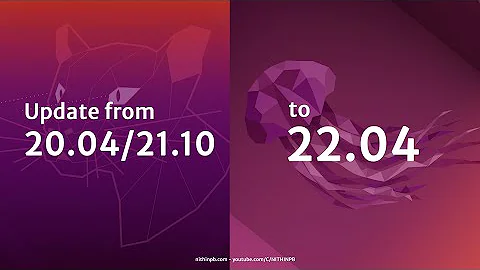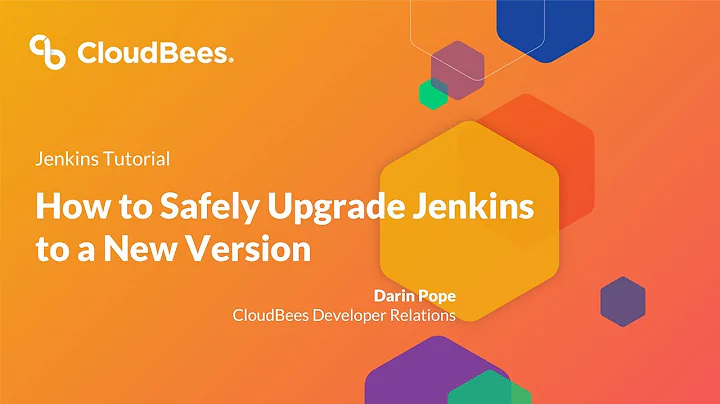Can I smoothly upgrade from one LTS to next LTS release?
Solution 1
Yes, you can upgrade from one Ubuntu LTS version to the next one, skipping the non-LTS releases in-between. It's intended to work that way and it gets tested.
Solution 2
You can upgrade smoothly through LTS releases whether it's Server or Desktop. It doesn't matter what you use, you just need to use these commands:
For Desktop Version:
sudo do-release-upgrade
For Server Version:
sudo apt-get install update-manager-core
sudo do-release-upgrade
NOTE: Please always make sure you test the target LTS you're being prompted to upgrade to in a LiveCD on the machine you're using to make sure everything works properly before going in for the real upgrade itself.
Solution 3
I trusted other answers and proceeded to the upgrade from an up-to-date 14.04 to 16.04 using do-release-upgrade. Now I am facing a kernel panic.
Here are other relevant questions (not mine), most unanswered :
- Problem with installing 16.04. Tried upgrading from 14.04
- Upgrading from 14.04 to 16.04 LTS causes black screen on boot
- Upgrade from 14.04 to 16.04 failed at startup
- Upgrading Xubuntu from 14.04 to 16.04.1 hangs at kernel panic
- Dell XPS 13 DE won't restart after failed update to Ubuntu 16.04 from 14.04
- Ubuntu 16.04 will not boot after update from 14.04
- I can't boot after upgrading to 16.04 (from 14.04)
- https://askubuntu.com/q/830298/136964
- Unable to login to Ubuntu after upgrade from 14.04 to 16.04
- etc. — there seems to be dozens of such opened issues on AskUbuntu, see the "related" tab on each of these links…
Therefore the actual answer to the question "can I smoothly upgrade from one LTS to next LTS release", in particular when applied to 14.04->16.04 upgrade as suggested in the OP, is clearly not "yes" — and most if not all answers are wrong in this regard.
At best, you might smoothly upgrade.
Solution 4
You can upgrade from one LTS version to another. If its smooth or not depends.
If you're referring only to the OS, the process is tested and if your hardware is compatible everything will be fine.
Don't forget though that you may have your own software/scripts/etc installed or other configurations that may have unmet dependencies in the new version. (eg.: you have some script with deprecated functions that are dropped in a newer version)
Solution 5
Upgrades from 14.04 to 16.04 are not automatically when 16.04 comes out in April but in July the first point release 16.04.1 will become available and all 14.04 users will be offered the upgrade then.
However, if you want to upgrade immediately, you do NOT need to upgrade to an intermediate release first. Just run the following in a terminal (and type your password):
sudo update-manager -d
You will then be offered the 14.04 -> 16.04 upgrade without waiting for 16.04.1.
The reason Ubuntu doesn't automatically offer 16.04 to 14.04 users is simple: those users are using a very stable LTS release, and might hit undiscovered bugs in 16.04 if they upgraded immediately at release. Any important bugs found in 16.04 should be fixed by the 16.04.1 point release, so LTS users have less chance of running into bugs in the new release.
Related videos on Youtube
Wouter Schoofs
Updated on September 18, 2022Comments
-
 Wouter Schoofs over 1 year
Wouter Schoofs over 1 yearQuestion is about Ubuntu release process. Are migrations from n to n+1 releases expected?
Assuming we have server with installed Ubuntu 14.04 LTS. Will it be smoothly upgradable to Ubuntu 16.04 LTS via apt-get upgrade ?
Assumptions:
- scope is software
- therefore we assume that given hardware is supported on both releases (upgrading from and to)
- that's why, always before upgrade you are asked to make backup to be able to revert in case of failure
-
Thomas Ward over 8 yearsShort answer: yes you can upgrade from LTS to LTS
-
Braiam over 8 yearsWhy would you assume you can't?
-
Zach Lipton over 8 yearsNote that if you delay and wait too long after the LTS release is no longer supported (which you shouldn't, because security updates), the upgrade process isn't quite so smooth.
-
 Admin over 8 years@GrzegorzWierzowiecki, a clarification: Arch is a rolling release, so there are no releases once you have it installed. A single
Admin over 8 years@GrzegorzWierzowiecki, a clarification: Arch is a rolling release, so there are no releases once you have it installed. A singlepacmancommand just gets you the latest. Arch has no named releases; all they do is cut a series of installers regularly. -
Sammaye over 8 yearsI used to find that this was so dodgy that you would be better off just reinstalling the whole thing, but I have not seen that in years, now it is seamless and so easy
-
 Wouter Schoofs over 8 years@jdv maybe I cut corners. Yes, you are right that Arch is rolling release. The analogy I see is that when you upgrade Arch in small increments, it goes quiet smoothly. However if you leave computer turned off for longer time and then try to update, it might be otherwise.I've ended up in such situation. To me analogy is that it's my experience, that it's less likely to succeed to do upgrade after break, contrary to small increments. And I didn't know if n.x -> (n+1).y in Ubuntu is considered enough small increment as n.x -> n.(x+1) ... Anyhow, thanks for feedback, should be helpful for readers!
Wouter Schoofs over 8 years@jdv maybe I cut corners. Yes, you are right that Arch is rolling release. The analogy I see is that when you upgrade Arch in small increments, it goes quiet smoothly. However if you leave computer turned off for longer time and then try to update, it might be otherwise.I've ended up in such situation. To me analogy is that it's my experience, that it's less likely to succeed to do upgrade after break, contrary to small increments. And I didn't know if n.x -> (n+1).y in Ubuntu is considered enough small increment as n.x -> n.(x+1) ... Anyhow, thanks for feedback, should be helpful for readers! -
 Admin over 8 years@GrzegorzWierzowiecki, yes, Arch requires you read the blog and forums before accepting a large upgrade. Again, this is the complete opposite of LTS. We exchange a system with older libraries and possibly out of date apps for more guarantees about upgrading. LTS is about stability and ease of upgrade, as answered below.
Admin over 8 years@GrzegorzWierzowiecki, yes, Arch requires you read the blog and forums before accepting a large upgrade. Again, this is the complete opposite of LTS. We exchange a system with older libraries and possibly out of date apps for more guarantees about upgrading. LTS is about stability and ease of upgrade, as answered below. -
 Wouter Schoofs over 8 years@jdv Thank you ! Thanks to all answers and comments I am absolutely convinced that Ubuntu Server LTS is good fit for few usecases I have in mind (like hope servers, "pet projects", "diy nas", etc). Thank you all ! :)
Wouter Schoofs over 8 years@jdv Thank you ! Thanks to all answers and comments I am absolutely convinced that Ubuntu Server LTS is good fit for few usecases I have in mind (like hope servers, "pet projects", "diy nas", etc). Thank you all ! :) -
 Admin over 7 yearsThe accepted response is wrong. The answer is NO, a large amount of hardware is not supported especially radeon hardware.
Admin over 7 yearsThe accepted response is wrong. The answer is NO, a large amount of hardware is not supported especially radeon hardware. -
 Wouter Schoofs over 7 years@PhillipMoxley added clarification and reminder about backup
Wouter Schoofs over 7 years@PhillipMoxley added clarification and reminder about backup
-
 Mark Kirby over 8 years@SuperSluether
Mark Kirby over 8 years@SuperSluetherdist-upgradeupdates the whole system, apps, kernel, the lot to the latest available versions but not the distribution,do-release-upgradewill upgrade to the next release, you should do adist-upgradeif you like new kernels and stuff, as opposed to the update manger, which just does, kernel updates for that version, apps and, security. -
dcorking over 8 yearsMerge Flimm's answer with yours and add your sources, and I'll upvote this
-
Bramski over 8 yearsThe last time I upgraded from one LTS to the next I had to wait for the first point release. Has this restriction been lifted?
-
 Dominic Hayes over 8 yearsYes, you can upgrade like the answers below say but you'll have to use the command on this answer to actually upgrade Ubuntu Versions.
Dominic Hayes over 8 yearsYes, you can upgrade like the answers below say but you'll have to use the command on this answer to actually upgrade Ubuntu Versions. -
guntbert over 8 years@DominicHayes you were asked to edit your own answer, not the other one.
-
 Mark Kirby over 8 yearsOK @DominicHayes I changed my vote, don't forget to comment when you edit, no one is notified of it.
Mark Kirby over 8 yearsOK @DominicHayes I changed my vote, don't forget to comment when you edit, no one is notified of it. -
 Mark Kirby over 8 years@GeraldSchneider This could be a new question, 16.04 is coming soon and this will be very relevant.
Mark Kirby over 8 years@GeraldSchneider This could be a new question, 16.04 is coming soon and this will be very relevant. -
 web.learner over 8 years@GeraldSchneider The point (no pun intended) of LTS releases is stability, so they don't enable the upgrade notifications until a point upgrade has been released. You can upgrade before however using
web.learner over 8 years@GeraldSchneider The point (no pun intended) of LTS releases is stability, so they don't enable the upgrade notifications until a point upgrade has been released. You can upgrade before however usingdo-release-upgrade(or one of its flags, I've forgotten the exact process). For more information see: askubuntu.com/questions/125392/… -
AlikElzin-kilaka almost 8 yearsTried
update-manager -dfrom 14.04 to 16.04. Broke the UI. -
Tyler almost 8 years@Seth
do-release-upgrade -dwill get you to 16.04 from 14.04 without waiting for 16.04.1 "point release" :-) Just did it the other day. That is... assuming your/etc/update-manager/release-upgradesincludes the defaultPrompt=lts -
Lord Loh. almost 8 yearsNow that 16.04.1 is out, I still cant do a do-release-upgrade on my ubuntu server 14.04 LTS. My question is here - askubuntu.com/questions/801488/…
-
 McGafter almost 8 yearsI think this should be the accepted answer as it actually shows you how to get it done. And it works...I've tested it.
McGafter almost 8 yearsI think this should be the accepted answer as it actually shows you how to get it done. And it works...I've tested it. -
 Admin over 7 years14.04 to 16.04 does not work for radeon hardware.
Admin over 7 years14.04 to 16.04 does not work for radeon hardware. -
Skippy le Grand Gourou over 7 yearsIt is intended to work that way, yet this very website hosts dozens of questions about failed 14.04->16.04 upgrade. A "kernel panic" is not what I call a "smooth upgrade"…
-
Skippy le Grand Gourou over 7 yearsAbout the smoothness : I followed this suggestion and am now facing a kernel panic. And there are dozens of similar issues reported on AskUbuntu about the 14.04->16.04 upgrade.
-
 Dominic Hayes over 7 yearsSkippy: There's always been the risk of that happening, which is why the community has suggested in the past to check a LiveCD of the target Ubuntu version first and it's also been known to happen during LTS upgrades now and then, sadly the only fix I can think of is using an Ubuntu 16.04 LiveCD, and if it works fine, install it over the '/' partition in Advanced Partitioning (Last option in install method suggestions) (which shouldn't be too much trouble given you gave '/home' a separate partition, otherwise, you'll need to back up the /home folders from the LiveCD)
Dominic Hayes over 7 yearsSkippy: There's always been the risk of that happening, which is why the community has suggested in the past to check a LiveCD of the target Ubuntu version first and it's also been known to happen during LTS upgrades now and then, sadly the only fix I can think of is using an Ubuntu 16.04 LiveCD, and if it works fine, install it over the '/' partition in Advanced Partitioning (Last option in install method suggestions) (which shouldn't be too much trouble given you gave '/home' a separate partition, otherwise, you'll need to back up the /home folders from the LiveCD) -
 Wouter Schoofs over 7 yearsHave you tried selecting different kernel during boot? My experience is that usually such thing happen when one did not update/upgrade long time and later during upgrades/updates /boot partition gets full. However I've encountered described problem during normal upgrades. (Therefore, I consider it problem with just "standard upgrade" part rather than something specific for full system upgrade). Then such kind of advices help. I have no idea if that's your case, but I hope it helps.
Wouter Schoofs over 7 yearsHave you tried selecting different kernel during boot? My experience is that usually such thing happen when one did not update/upgrade long time and later during upgrades/updates /boot partition gets full. However I've encountered described problem during normal upgrades. (Therefore, I consider it problem with just "standard upgrade" part rather than something specific for full system upgrade). Then such kind of advices help. I have no idea if that's your case, but I hope it helps. -
Skippy le Grand Gourou over 7 years@GrzegorzWierzowiecki Thanks for the suggestion, but in my case there was no hope to get a clean setup back : the init system had disappeared and apt's dependency tree was completely broken. (And I made sure I had enough free space beforehand.)
-
 Wouter Schoofs over 7 yearsSaid to hear. One day I managed similar situation on other Distro to recover from Live CD/Dvd, and a lot of manual clean ups, I am not sure if I would repeat it again, more likely took backup ofnwhat's left amd start from scratch. Good luck!
Wouter Schoofs over 7 yearsSaid to hear. One day I managed similar situation on other Distro to recover from Live CD/Dvd, and a lot of manual clean ups, I am not sure if I would repeat it again, more likely took backup ofnwhat's left amd start from scratch. Good luck! -
Skippy le Grand Gourou over 7 years@GrzegorzWierzowiecki Having /home on a separate partition makes it way less sad that it seems. ;-)
-
 Wouter Schoofs over 7 yearsand /etc and /usr ... ;) all depends where does your customisations live/reach
Wouter Schoofs over 7 yearsand /etc and /usr ... ;) all depends where does your customisations live/reach -
 Matt about 7 years
Matt about 7 yearssudo: update-manager: command not found -
 userDepth over 6 yearsThis is how I do release upgrades, it has worked every time. Now in 18.04 I will test with an LTS upgrade. I'm using 16.04
userDepth over 6 yearsThis is how I do release upgrades, it has worked every time. Now in 18.04 I will test with an LTS upgrade. I'm using 16.04 -
dragon788 over 6 yearsTypically kernel panics occur if you aren't using the bog standard stock Ubuntu kernel and you use ANY drivers that "taint the kernel" eg most video card drivers, some network drivers, and other third party applications. There are definitely cases where this isn't super smooth, but if you disable 3rd party repos/PPAs and disable/uninstall proprietary video card drivers using the driver utility before upgrading you typically don't have many issues.
-
 Adam.at.Epsilon over 5 yearsit would then seem, because
Adam.at.Epsilon over 5 yearsit would then seem, becausedo-release-upgradeclaims it takes "hours" to do an upgrade, that a re-install is the better option for my desktop. Installing from a CD typically takes about 20-40 minutes the last few times I did it. -
cipricus almost 3 years@Adam.at.Epsilon - If by "hours" was meant the info in answers under here, consider the fact that those answers are old, relating to old CPUs with lower process speed.






